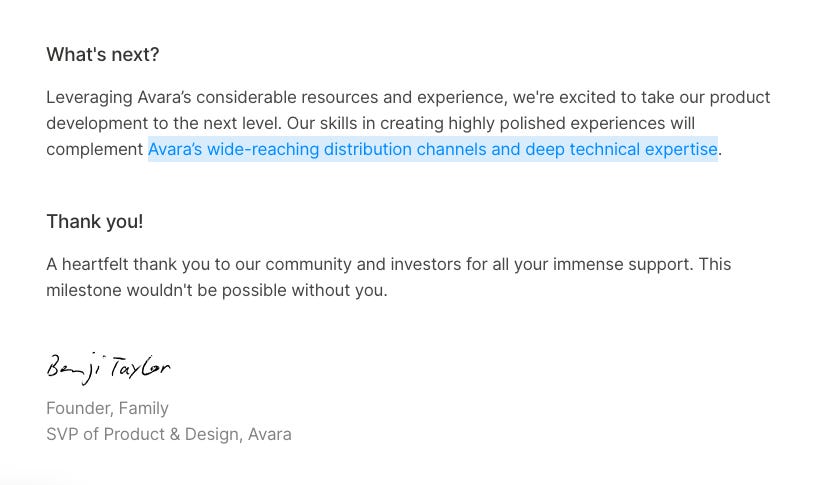What's up with Avara?
A leading crypto venture studio or a goliath in disguise?
AAVE completed of web3’s most successful disaffiliation stories.
(Disaffiliation is basically a way of showing governments that you didn't launch a security by severing the ties of your protocol and the team that created it.)
AAVE Companies (now Avara) have:
Visibly focused on developing other unrelated assets like Lens
Disincorporated the AAVE core team into entities like Bored Ghosts Developing
With their new announcement they are removing AAVE from their name completely, and adding one more product (the Family wallet) to the mix.
Their focus is increasingly moving away from incremental refinements to algorithmic money markets and into the brave goal of total crypto market expansion.
Yet they balance this focus on consumer needs with fundamental innovation. They are even hiring a Staff Move Engineer for what I'm guessing is an unannounced project.
A venture studio?
On the surface, Avara looks a lot like a venture studio.
They house talented individuals who can build web3 protocols and applications but let them loose on fairly divergent problems.
Does a decentralized social network have a lot in common with a lending market other than perhaps a shared go-to market pipeline?
The Family acquisition note even speaks merely to the go-to market and technical advantages of working with Avara.
This is a standard venture studio playbook.
But if you squint long enough, you start to notice some synergies within their portfolio.
In a previous post, I argued that Uniswap Labs owning a wallet surface and UniswapX are plays that make sense in the context of aggregation theory.
Avara now has their own aggregator in the Family wallet which could be used to favorably route users to Lens and AAVE.
Even Lens addresses an important bottleneck for AAVE.
As a market leader in lending, the highest leverage driver of growth is actually market expansion.
And what better way to expand beyond finance than with a social network?
On monopolies and true centralization
However, market expansion is something that benefits all lending protocols.
And I doubt that the Family wallet team will be keen to pursue anti-competitive practices (or that AAVE needs them to any time soon).
Instead, I'd argue that Avara is a refreshing and honest attempt to build new and innovative products in highly competitive markets.
While many crypto companies argue that decentralization is a primary objective, you can't really fund fully decentralized companies.
You don't truly understand a crypto company before you understand what they are trying to centralize.
It may not be a technology or network, it could even be a social construction.
For example, you could caricature a company as benevolent as Optimism by saying they are creating a flywheel to centralize all public goods funding in crypto.
In this world, Avara is a refreshing counter-point.
While their companies may share the goal of driving crypto market expansion through technical & product excellence, you could hardly call them a centralizing force.
And for that reason, it's a model I would love to see explored by other large protocol teams.



